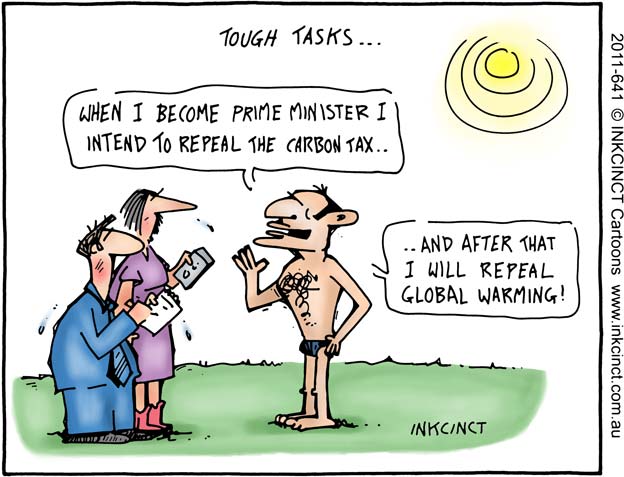Search
Recent comments
- peer pressure....
2 hours 22 min ago - strike back....
2 hours 28 min ago - israel paid....
3 hours 31 min ago - on earth....
8 hours 1 min ago - distraction....
9 hours 11 min ago - on the brink....
9 hours 20 min ago - witkoff BS....
10 hours 35 min ago - new dump....
22 hours 27 min ago - incoming disaster....
22 hours 34 min ago - olympolitics.....
22 hours 39 min ago
Democracy Links
Member's Off-site Blogs
the vision thing .....

Opposition Leader Tony Abbott articulates an alternative vision for the country with Clarke & Dawe.
- By John Richardson at 21 Jun 2012 - 11:36am
- John Richardson's blog
- Login or register to post comments
the little people .....
The old refrain that 'oppositions don't win elections, governments lose them' is certainly true of the Abbott ascendancy.
The Opposition has not achieved its position of dominance in the polls by mapping out an alternate vision for the nation; rather, it has sought to tap into a thick vein of community resentment towards the Government.
This 'small-target strategy' has been a mainstay of oppositions from both sides of politics for decades, but whether it's good for voters is another story.
Former Liberal leader Dr John Hewson broke the mould when he offered a radical policy alternative to the Keating government in 1993. The 'Fightback' manifesto proved to be manna from heaven for Labor, and Keating successfully used the controversial policy to dismantle his opponent, winning 'the unwinnable election' in the process.
Both sides of politics took lessons from the Hewson experiment.
The Liberals were scarred, and under the leadership of John Howard went into the 1996 election with the more modest aim of making Australians "relaxed and comfortable". It may sound like something you would expect from a luxury holiday, not a federal government, but the rhetoric worked on an electorate disillusioned with the big picture vision of its prime minister.
On the Labor side, Opposition leaders Beazley and Rudd both sought to neutralise potential attacks by cherry-picking Howard government policies.
The Abbott Opposition, however, has taken the strategy to the next level and makes no apologies for trying to stay under the radar.
Abbott refuses to be drawn on policy detail on the basis that, "It's not the role of the Opposition to solve the Government's problems." This may be true, but surely it is the role of the Opposition to offer solutions to the nation's problems.
Rather than inspiring change with a positive vision for the future, Abbott seems to be waging a war of attrition on the Australian public. After three years of harping and whining, he hopes that, like a frustrated parent finally caving in to a demanding toddler, we will begrudgingly give him the keys to the Lodge.
If the polls are correct, while the Opposition continues to trounce the Government, there is certainly little enthusiasm for an Abbott prime ministership. Abbott's obsession with an early election perhaps indicates that he doubts how long this approach can be sustained.
Small-target politics might serve the interests of the Opposition, but what of the health of our democracy?
The absence of an alternative policy framework makes it difficult for voters to make informed judgments. The grass is always greener on the other side, and it's easy to simply say 'no' without being constrained by the realities of government.
More worryingly for voters, there is the potential for the Opposition to be given a blank cheque if they succeed at the next election. It's difficult to hold a government to account for broken promises if no concrete commitments were made when it was in opposition. Yet conversely, the electorate is unlikely to look fondly on a new government that adopts a program for which it has no mandate.
And finally, the small-target approach also presents challenges for the Coalition should they return to government. The cautious opposition model has prevented meaningful discussion of the very issues that led the Coalition to be rejected by the electorate five years ago. If these are not resolved now, there is certainly not the space to deal with them in government.
The Coalition need only turn to the crisis of identity that has crippled Labor in power to see the results of failing to use years in opposition to settle internal differences around policy and ideology.
Industrial relations, for instance, appears to be a ticking time bomb for Abbott, and despite his attempts to keep Work Choices dead and buried (and cremated!), many of his colleagues are still committed to life after death. The temptation for some form of resurrection if in government would surely be difficult for them to resist. The debate would be messy at best.
Tony Abbott is often described as the nation's most effective Opposition Leader. This may well be the case, but unless he wants that to be his political legacy, it might be time to start telling us what he actually wants to do if he ever becomes prime minister.
Robert Simms is a former adviser to Greens Senators Hanson-Young and Ludlam. He is currently undertaking a Masters by Research at Flinders University in South Australia. View his full profile here.